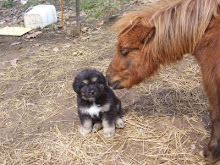Ok, you've gotten your seed catalogs. You're excited by all those gorgeous pictures but then you get down to the descriptions and you're not sure it's in your native language. Don't put the catalog down in frustration, just read the following definitions to those foreign words. You will be an expert before you know it.
Heirloom - means the plant is open-pollinated (non-hybrid) and the seed source goes back at least 50 years. These plants are very popular right now, and rightly so. Generally speaking, they are tastier, fun to collect and you can save their seed. So many of the hybrid varieties have been bred for a specific purpose, often smaller plants, durability when shipping, almost anything but flavor. The old heirloom varieties have been passed down from generation to generation because they performed well in gardens and because they had great flavor.
Open-pollinated - are varieties that grow true from seed. This means they are capable of producing seeds from this years plants, which will produce seedlings that are just like their parent plants. Hybrids are a cross between two varieties, which means if you were to save their seeds you could not be certain how those seeds would grow.
Determinate - this is a designation most often used when talking about tomato plants. It means their size is determined. They will only grow to a certain height and then they will stop growing. This is an advantage to some gardeners, especially those growing in small spaces or who container garden. They will also set most of their fruit at the same time, which will give you a large harvest all at once.
Indeterminate - these tomato plants will grow indefinitely, limited by the weather in your area. They can become very tall, although you can control this by pinching off the growing tip of your plant once it reaches the size you desire. The plant will then invest the rest of its energy bushing out and setting fruit. One of the advantages of indeterminate plants is they will continually produce blossoms, thus you can have fruit over a longer period. In general, indeterminate plants will start producing a little later than determinate plants but you will get tomatoes over more of the season.
organic - in the gardening world, organic means that no artificial chemicals have been used to produce the plant that gave the seed and that no chemicals have been used on the seed. This has become a contentious word for some. Since growing in popularity, the term has almost been co opted by the corporate world. There are many great farmers out there that grow in an organic manner and don't use chemicals but are not able to get their farm certified due to the extreme cost and red tape it takes to now a days be certified. Buy or trade seed from a source you trust. Thereby guaranteeing a seed that will germinate well and be free from pesticides and herbicides.
perennial - are plants that grow for 3 or more seasons. This will depend on your growing zone. If your winters are too cold, this plant could die over the winter and not return the next year. There are a lot more plants that are perennial in Florida than in South Dakota. I live in Kansas City, Missouri and often will find plants that are labeled perennials at my local nursery. When I look closer I realize they are only perennials up to zone 7. Since I'm a zone 5, they will not survive the winter where I live. Be careful of this term because it could be used misleadingly. There are only a few true perennials in the vegetable world, asparagus, artichoke, walking onions, and horseradish are a few. There are quite a few perennial fruits and herbs. Which brings up another thing to think about, some perennials will produce and live longer than others. Often you will hear the term short lived perennial, strawberries would qualify as a short lived perennial.
annuals- these are plants that grow from seed, set seed, spread their seed and die in the same season. Most of your vegetables fall under this category.
biennials - these are vegetables that will grow for two seasons before dying. They will produce and distribute their seeds in the second season. There a quite a few vegetables that are true biennials, although we treat them as annuals in our garden. They produce whatever it is we like to eat the first year. If you were to want to collect their seeds you would have to wait until the end of the next growing season to be able to do so. Onions, carrots, turnips and beets are biennials.
One word of caution, it is not really a definition, however, it is something to watch out for when buying seeds. If you want to get flower seeds and in the definition it says something like naturalizes easily, vigorous grower or self sows readily. Be prepared for a plant that will quickly take over your garden. This is the catalogs politically correct way of saying the plant can become weedlike. This could be a desirable trait in the right condition but it is definitely something you should be aware of.
Armed with this new knowledge, grab a highlighter and your catalog and pick some great varieties that are sure to be your new favorites.
Saturday, January 31, 2009
Deciphering Your Seed Catalog
Labels:
annual,
catalog,
determinate,
heirloom,
indeterminate,
organic,
perennial,
seed
Subscribe to:
Post Comments (Atom)

Who knew? And why aren't all these explanations in the magazines?!? Thanks for sharing!
ReplyDelete